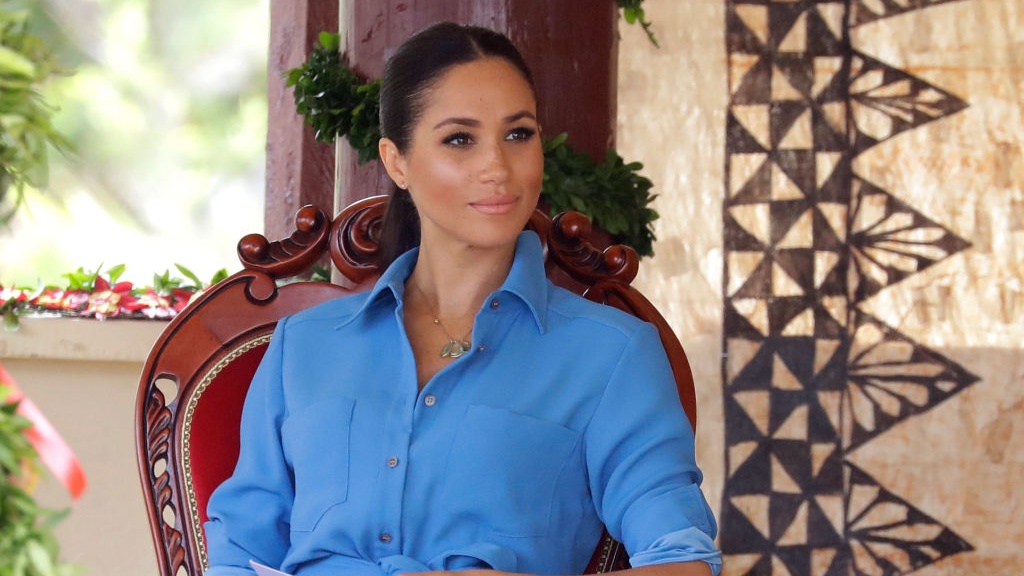Oprah Winfrey's highly anticipated interview with Duchess of Sussex, Meghan Markle sent shockwaves across the globe on Sunday night. The takeaway: Black women everywhere are repeatedly the subject of scrutiny for simply existing.
While there’s a long-standing dichotomy between the United States and the United Kingdom, both nations do share what's been proven to be a debilitating penchant for misogynoir.
Markle's recountings of her treatment throughout her engagement and marriage to Duke of Sussex, Prince Harry is a prime example of misogynoir. Regardless of royal titles, or celebrity status, her experience was relatable to Black women throughout the globe. No matter how covert or overt it is, racism is painfully universal.
Following the revelatory interview, co-host of E!'s Nightly Pop Nina Parker wrote on Twitter, "You know why Black women believe Meghan? Because we know exactly what microaggressions look like. And how they slowly drive you insane. #OprahMeghanHarry."
You know why Black women believe Meghan? Because we know exactly what micro aggressions look like. And how they slowly drive you insane. #OprahMeghanHarry
— Nina Parker (@MzGossipGirl) March 8, 2021
Despite having developed a reputation as an outspoken and tenacious advocate for women's rights, Markle, who admitted to being on the brink of suicide as a result of her mistreatment, said her pain was silenced by the royal family who told her she couldn't seek refuge in therapy.
"I just didn't want to be alive anymore," Markle admitted.
Prior to to the suicidal ideation, Meghan was on the receiving end of a whirlwind of racist press.
When friends tearfully expressed the negative public image of her that had begun to unfold, she reassured them that she'd be fine because the royal family was protecting her.
They weren't. And too many Black women fall under this same delusion.
From the palpable absence of Black men showing up for the "Say Her Name" movement dedicated to Black women and girls whose lives have been stolen by police violence to the hardships that can come simply by being a #BlackWomanAtWork, the trauma of feeling outcast as Black woman is pervasive.
But we're speaking out about it.
Just last summer, actress Gabrielle Union
faced backlash on the set of America's Got Talent after vocalizing concerns about the racially toxic environment she was involved with.
"Y'all have deemed her a liar after months of trying to inform y'all of the issues in the workplace and also to make sure other employees of color that comes after her won't have the same experiences," her husband, Dwyane Wade said after Union was threatened over her allegations of racism on the set of the NBC show.
To make matters worse, a surprising non-ally was found in her co-host Terry Crews who effectively threw her under the bus. Months prior, Black women had the actor's back when he came forward about an alleged sexual assault.
Markle, Union and countless other Black women celebrities have experienced this devastating iteration of a double consciousness — one which poet Amanda Gorman succinctly captured this past weekend when she suggested she was also subject to racist mistreatment.
After saying a security guard followed her home for looking "suspicious," the poet expressed a devastating reality Black public figures know all too well: "One day you're called an icon, the next day, a threat."
In a sense, he was right. I AM A THREAT: a threat to injustice, to inequality, to ignorance. Anyone who speaks the truth and walks with hope is an obvious and fatal danger to the powers that be. https://t.co/hY9miR0b6J
— Amanda Gorman (@TheAmandaGorman) March 6, 2021
But she also expressed that she's part of a movement of disruption.
"In a sense, he was right. I AM A THREAT: a threat to injustice, to inequality, to ignorance. Anyone who speaks the truth and walks with hope is an obvious and fatal danger to the powers that be," the poet, who turned a mere 23 just two days later, wrote.
She is among countless Black women refusing to stay silent in pain forced upon us by institutionalized racism. We're calling out any disparities in outrage over Breonna Taylor and George Floyd, holding our workplaces accountable and simply demanding everyone do better by us.
During the conversation, Markle explained that she was told baby Archie would not be getting royal protection, nor would he be given a title, which is against protocol. When Oprah asked the duchess what she believed to be the reasoning behind the rescinding of Archie's royal birthrights, she responded that there were "concerns and conversations about how dark his skin might be when he's born. She opted not to reveal who initiated those discussions — a stunning act of grace considering there didn't appear to be much of that same quality extended to her.
Markle feeling that there was no other way out from the racist and misogynistic treatment she endured other than to end her life is a dark reality that Black women are sometimes confronted with. It's the reason the interview was so somewhat unexpectedly resonant.
“Having seen the interview, I came away feeling deeply unsettled," Vogue Global Network Journalist Eni Subair said. "For many Black women, Meghan’s experience is so triggering because it’s not an isolated issue. Archaic tropes and microaggressions such as the ‘angry Black woman,’ ‘the aggressor’ and the ‘bully’ are so deeply embedded within our day-to-day interactions that it feels so very familiar."
We've all heard it before, but to reiterate, our sisters must be protected at all costs. So, to Meghan — we see you, we hear you, we stand with you and most importantly — we feel you. We know we have each other's back but we also know that's no longer enough.
If you're experiencing thoughts of suicide, please call the National Suicide Prevention Lifeline at 1(800) 273-8255.
